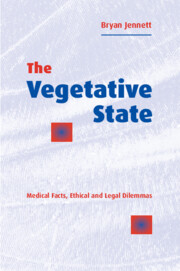Book contents
- Frontmatter
- Contents
- Foreword
- Preface
- Acknowledgements
- An appeal to doctors
- Traumatic decortication
- List of abbreviations
- 1 A syndrome in search of a name
- 2 Diagnosis
- 3 Epidemiology
- 4 Pathology of the brain damage
- 5 Prognosis for recovery and survival
- 6 Attitudes to the permanent vegetative state
- 7 Medical management
- 8 Ethical issues
- 9 Legal issues in the United States
- 10 Legal issues in Britain
- 11 Legal issues in other countries
- 12 Details of some landmark cases
- Epilogue
- Index
6 - Attitudes to the permanent vegetative state
Published online by Cambridge University Press: 21 December 2009
- Frontmatter
- Contents
- Foreword
- Preface
- Acknowledgements
- An appeal to doctors
- Traumatic decortication
- List of abbreviations
- 1 A syndrome in search of a name
- 2 Diagnosis
- 3 Epidemiology
- 4 Pathology of the brain damage
- 5 Prognosis for recovery and survival
- 6 Attitudes to the permanent vegetative state
- 7 Medical management
- 8 Ethical issues
- 9 Legal issues in the United States
- 10 Legal issues in Britain
- 11 Legal issues in other countries
- 12 Details of some landmark cases
- Epilogue
- Index
Summary
The medical, ethical, legal and public policy controversies that have followed the recognition of this state stem from how different people regard indefinite survival in a vegetative state. The arguments have focused mainly on the issue of withholding or withdrawing life-prolonging medical treatment, and later chapters deal with the ethical and legal issues raised by contemplating such a decision. However, the question of limiting treatment must be anticipated to some extent in this chapter because information about how the vegetative state is regarded comes partly from the comments of ethicists and lawyers dealing with this problem, as well as from asking various groups of people how they would themselves want to be treated if they were permanently vegetative, and professionals how they would want to deal with their vegetative patients.
In 1969, before the vegetative state was formally described, a physicist from Cambridge University wrote ‘An appeal to doctors’ in the Lancet (1). He imagined the horror of surviving after a road accident with severe brain damage (p. xii), and claimed that it was no longer generally true that it was always in a patient's interest that life should be preserved by all available means. The editorial response was unsympathetic but two years later, when the Lancet reported two patients who had survived for 5 months with neocortical necrosis from anoxic brain damage, an editorial comment was titled ‘Death of a human being’ (2).
- Type
- Chapter
- Information
- The Vegetative StateMedical Facts, Ethical and Legal Dilemmas, pp. 73 - 86Publisher: Cambridge University PressPrint publication year: 2002



